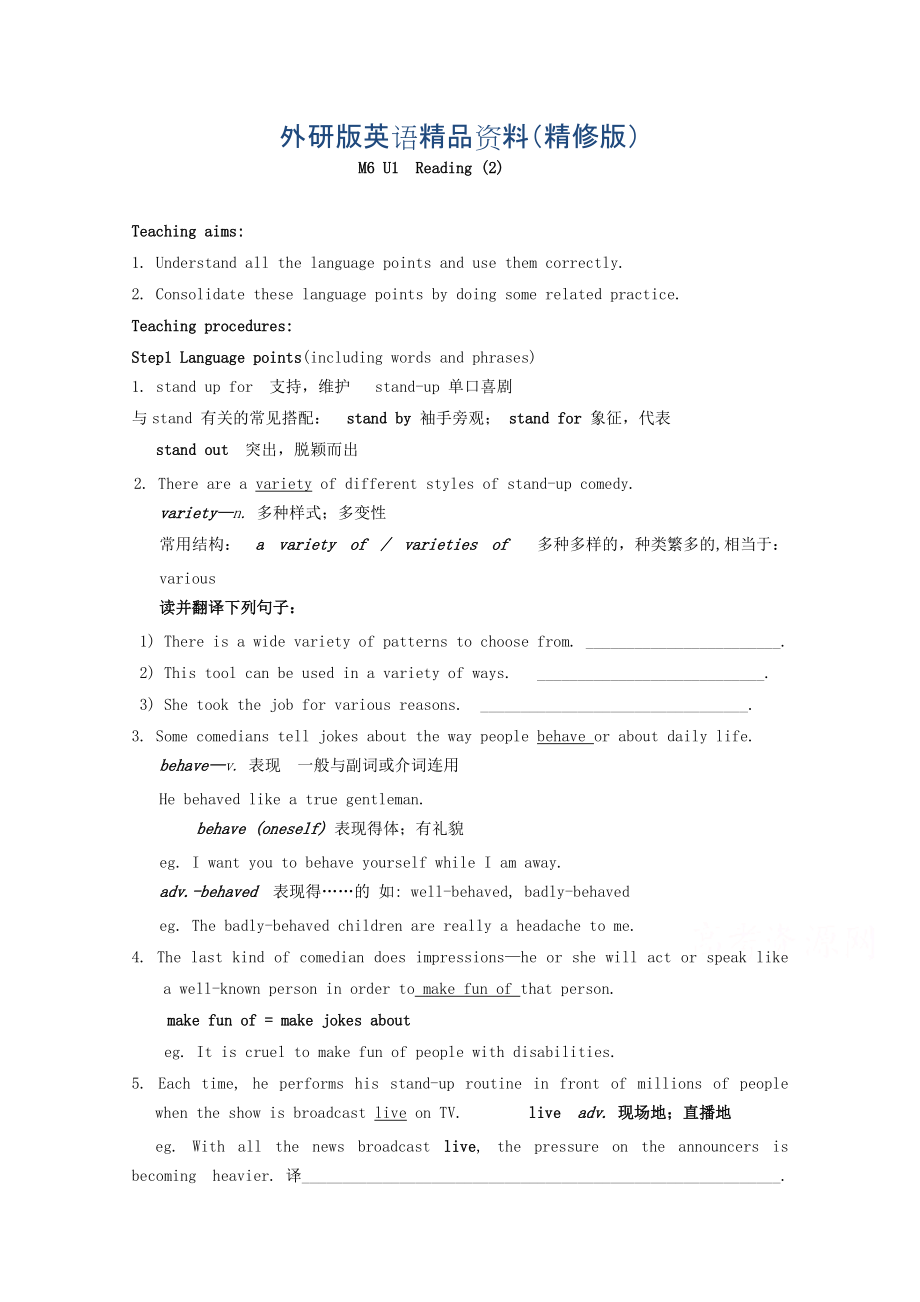《江蘇省徐州市高中英語(yǔ)選修六M6 U1 Reading2 學(xué)案精修版》由會(huì)員分享���,可在線(xiàn)閱讀�����,更多相關(guān)《江蘇省徐州市高中英語(yǔ)選修六M6 U1 Reading2 學(xué)案精修版(3頁(yè)珍藏版)》請(qǐng)?jiān)谘b配圖網(wǎng)上搜索��。
1��、
外研版英語(yǔ)精品資料(精修版)
M6 U1 Reading (2)
Teaching aims:
1. Understand all the language points and use them correctly.
2. Consolidate these language points by doing some related practice.
Teaching procedures:
Step1 Language points(including words and
2���、 phrases)
1. stand up for 支持�,維護(hù) stand-up 單口喜劇
與stand 有關(guān)的常見(jiàn)搭配: stand by 袖手旁觀(guān)���; stand for 象征����,代表
stand out 突出���,脫穎而出
2. There are a variety of different styles of stand-up comedy.
variety—n. 多種樣式��;多變性
常用結(jié)構(gòu): a variety of / varieties of 多種多樣的���,種類(lèi)繁多的,相當(dāng)于:various
讀并翻譯下列句子:
1) There
3、 is a wide variety of patterns to choose from. ________________________.
2) This tool can be used in a variety of ways. ____________________________.
3) She took the job for various reasons. _________________________________.
3. Some comedians tell jokes about the way people behave or about
4���、daily life.
behave—v. 表現(xiàn) 一般與副詞或介詞連用
He behaved like a true gentleman.
behave (oneself) 表現(xiàn)得體���;有禮貌
eg. I want you to behave yourself while I am away.
adv.-behaved 表現(xiàn)得……的 如: well-behaved, badly-behaved
eg. The badly-behaved children are really a headache to me.
4. The last kind of co
5、median does impressions—he or she will act or speak like a well-known person in order to make fun of that person.
make fun of = make jokes about
eg. It is cruel to make fun of people with disabilities.
5. Each time, he performs his stand-up routine in front of millions of people when the sh
6���、ow is broadcast live on TV. live adv. 現(xiàn)場(chǎng)地���;直播地
eg. With all the news broadcast live, the pressure on the announcers is becoming heavier. 譯___________________________________________________________.
live adj. 現(xiàn)場(chǎng)的,直播的��;有生命的���,活的
eg. We are watching the live coverage of the Olympics.譯:__
7����、______________.
6. One reason Crystal has become so famous is that he is very quick thinking, and is often able to come up with new jokes about the people and things around him.
克里斯托如此有名的一個(gè)原因是他思維敏捷����,他經(jīng)常能夠想出關(guān)于周?chē)娜嘶蚴碌男滦υ?huà)來(lái)。 come up with 想出��;拿出
1) She came up with a new idea for increasing
8�����、sales.她想出了增加銷(xiāo)售的新主意。
2) How soon can you come up with the money? 你什么時(shí)候能拿出這筆錢(qián)���?
(回憶或查出下列詞組的意思)
come up _______come out ________ come to _______ come across _________
catch up with ________end up with __________keep up with _______________
1) The bill came to $30. ______________________
9���、_________。
2) She came across some old photographs in a drawer. ______________________����。
3) When is his new novel coming out? _________________________________?
4) The subject came up in conversation. ________________________________�。
7. Doctors have been researching what effect stand-up an
10、d other forms of comedy have on us. have an effect on \ have effects on 對(duì)......有影響
You will find what great benefit the computer you own can be _____ each time you use it to help you work.
A. for B. at C. on D. of
8. Crystal is popular with all age groups and has the
11�、 ability to amuse people all over the world prove that stand-up can be enjoyed by everyone.
amuse vt. ________________
Eg. (1) My funny drawings amused the kids. ____________________________。
(2) She thought out several ideas to help Laura amuse the twins.
amused adj. 感到好笑的 amusing
12��、adj. 逗人笑的���,有趣的
amusement n. 可笑��,娛樂(lè) to one’s amusement =to the amusement of sb.
Step2 More phrases (譯成漢語(yǔ))
1) lose weight _______________ 2) queue up ________________
3) later on _______________ 4) make up ________________
5) give a speech ____________ 6) howl with lau
13��、ghter _________________
7) follow in the footsteps of _____________________
Step3 Practice 用“l(fā)ive” “alive” and “l(fā)iving” (活的)填空:
(1) Who is the greatest man ___________?
(2) She must be ______________.
(3) Let’s keep the fish ____________.
(4) Have you seen a___________whale?
(5) She was
14����、frightened at the sight of a ____________ snake.
(6) Many______________things are dying out because of the global warming.
(7) Maybe he is the finest ____________ pianist.
用法區(qū)別如下:
alive: 既可以指人,也可以指物����。在句中做表語(yǔ)或賓語(yǔ)補(bǔ)足語(yǔ)。做定語(yǔ)時(shí)應(yīng)放在 所修飾的名詞之后����。
live: 常做定語(yǔ)����,放在所修飾的名詞之前,一般不指人�。
living: 用作定語(yǔ)或表語(yǔ),即可指人����,也可指物。作定語(yǔ)時(shí)前置���。
15�����、
Step4 Translation:
1.有一種非常出名�����,深受人們喜愛(ài)的喜劇形式叫做單口喜劇�。
_______________________________________________________________________________
2 單口喜劇演員可以拿某一觀(guān)眾開(kāi)玩笑,也可以根據(jù)觀(guān)眾的反應(yīng)隨機(jī)應(yīng)變,說(shuō)不同的笑話(huà)��。
_______________________________________________________________________________
3 觀(guān)眾只能看見(jiàn)他站在那里兩片嘴唇動(dòng)個(gè)不停����。
_______________________________________________________________________________
4 克里斯托放棄了講事先準(zhǔn)備好的笑話(huà),即興編了一個(gè)�。
_______________________________________________________________________________
5 克里斯托深受各年齡斷人群的喜愛(ài),他有能力讓世人感到開(kāi)心�。
_______________________________________________________________________________
 江蘇省徐州市高中英語(yǔ)選修六M6 U1 Reading2 學(xué)案精修版
江蘇省徐州市高中英語(yǔ)選修六M6 U1 Reading2 學(xué)案精修版

